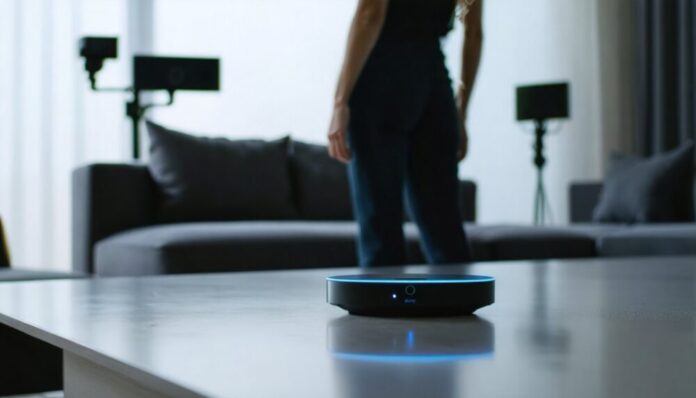Voice assistants offer outstanding convenience but present critical concerns about privacy and surveillance. Their always-on nature raises security vulnerabilities, exposing users to cyber threats and unauthorized data access. Commercial exploitation of collected voice data further blurs the lines between user service and intrusive monitoring. Regulatory challenges and data breaches exacerbate these issues, creating a climate of mistrust. As technology advances, understanding the balance between user control and privacy becomes essential. More perspectives are available on this complex topic.
Highlights
- Voice assistants enhance user experience through immediate activation but blur the line between necessary security and invasive surveillance practices.
- Privacy concerns arise as 31% of users worry about continuous microphone functionality posing risks to personal data and safety.
- Cyber threats, such as dolphin attacks, exploit voice assistants’ vulnerabilities, compromising user privacy amidst increased connectivity with IoT devices.
- Data collection and voice profiling by companies exploit personal information, raising ethical questions regarding user consent and surveillance.
- The need for transparency and user control over voice data is crucial to restore trust and mitigate privacy concerns surrounding voice assistant technology.
The Always-On Nature of Voice Assistants
The always-on nature of voice assistants represents a significant shift in user interaction with technology, blending convenience with potential privacy concerns. Users often remain unaware that these devices continuously monitor audio, listening for specific wake-words like “Hey Siri” or “Ok Google.” Voice data consists of recorded commands or queries that enhance the device’s capability. Despite 76% of Americans admitting to using voice assistants, many do not adjust their microphone settings, as evidenced by a survey indicating that 68% have taken no privacy measures. This passive listening guarantees immediate voice activation, a core benefit that enhances user experience. However, with 31% expressing privacy concerns about the uninterrupted microphone functionality, it raises pertinent questions about user awareness and responsible technology use. AI voice assistants enable multitasking with unmatched efficiency, allowing users to perform tasks hands-free. Moreover, the integration of smart devices that automate chores can further complicate this balance, as the convenience they offer comes with a caveat of increased data collection. Understanding these dynamics promotes a communal dialogue around balancing convenience against privacy protection.
Risks of Security Vulnerabilities
While offering unmatched convenience, voice assistants also present significant security vulnerabilities that can jeopardize user privacy and data integrity. These devices constantly listen for wake words, inadvertently capturing sensitive conversations which can then be leaked or accessed by third-party vendors without user consent. Cyber threats such as dolphin attacks employ inaudible frequencies to manipulate voice assistants, leading to unauthorized access and potential misuse of data. Additionally, the interconnected nature of voice assistants and IoT devices increases vulnerabilities, allowing malicious actors to infiltrate whole networks with a single compromised device. With voice recognition technology posing a significant target for hackers, ensuring strong passwords is vital for data protection practices. As a result of these vulnerabilities, voice assistants can be easily targeted by malicious commands from attackers. Users must remain vigilant to mitigate the risks associated with these emerging technological perils.
Commercial Exploitation of Voice Data
Vulnerabilities in security naturally lead to concerns regarding how voice data is employed commercially. With the voice assistant market anticipated to soar to $33.74 billion by 2030, businesses increasingly engage in data mining to extract actionable perspectives from recorded interactions. Voice profiling enables companies to tailor marketing strategies, often exploiting personal information concealed in users’ vocal subtleties. This practice raises ethical implications, as insurance firms can assess risk based on voice data, potentially leading to discriminatory pricing. Particularly, the intimacy of voice data reveals more than mere words; it taps into emotional sentiments and consumer behavior, creating both opportunities and threats in how individuals engage with brands. As the market expands, greater scrutiny on these practices becomes imperative, providing deeper understandings from the complexity and allowing companies to leverage a deeper comprehension. Furthermore, the overall consumer satisfaction with voice assistants is remarkably high, with some studies reporting a 93% satisfaction rate, emphasizing the delicate balance between user contentment and privacy concerns. Additionally, the intelligent virtual assistant market is expected to grow at a CAGR of 35.1% from 2023 to 2033, indicating that this trend of data exploitation may only intensify.
Implications of Voice Cloning Technology
As technology advances, voice cloning emerges as a powerful tool with significant implications that extend beyond mere novelty. The accessibility of this technology raises pressing voice ethics concerns, particularly with the proliferation of cloning risks in fraudulent activities. Scammers are increasingly using realistic voice replicas to manipulate emotions and deceive individuals, especially vulnerable populations like the elderly. Additionally, unauthorized replication of celebrities’ voices poses dilemmas for intellectual property rights and personal consent. While voice cloning offers benefits in medical and assistive situations, such as aiding those with speech disabilities, a fine balance must be struck to guarantee that the technology is utilized responsibly, safeguarding against its potential misuse and protecting individuals’ identities and legacies. Notably, voice cloning has the ability to capture speech patterns, accents, intonations, and nuances of breathing, making it even more realistic and harder to detect when misused. The technology’s potential to create deepfakes raises serious concerns about trust and misinformation in society. With the capability to provide rapid voice cloning, the risk of misuse is heightened as the ease of creating convincing voice replicas increases.
Regulatory Compliance and Data Breaches
Despite the rapid adoption of voice assistants, significant regulatory compliance issues and data breach risks have emerged, raising alarms about user privacy and data security. Recent incidents, such as the Qantas data leak, exposed millions of customer records, underscoring inadequacies in compliance standards. Major corporations, like Google and Amazon, faced numerous complaints for violating wiretapping laws and GDPR regulations while mishandling voice data. As average data breach costs soared to $4.88 million in 2024, the urgent need for resilient data encryption solutions has become increasingly evident. The trend of increasingly severe data breaches, including the Qantas data leak, highlights an urgent need for organizations to prioritize compliance with industry standards, nurturing trust and safeguarding user information in a terrain fraught with vulnerabilities. AI data security mismanagement remains a pervasive threat, as cybercriminals exploit loopholes in security systems to access sensitive information.
User Control and Transparency Issues
While users increasingly rely on voice assistants for convenience, significant gaps in user control and transparency reveal a troubling reality about data privacy. Many users mistakenly believe their voice data is processed locally, when in fact it often resides on cloud servers, diminishing user autonomy and data ownership. Privacy controls prove inadequate, with studies indicating that many applications collect excessive permissions and often lack proper disclosure practices. In multi-user homes, only primary users gain full control, leaving others vulnerable to unauthorized data access. The pervasive absence of transparency hinders the fulfillment of privacy policies, leaving users uneasily aware of their data’s fate. Addressing these issues is vital for promoting trust and enabling users in their digital interactions. Furthermore, voice assistants have become integral to smart environments, emphasizing the need for better oversight and control mechanisms. Implementing a clear indicator, like an LED light, shows when voice assistants are actively listening to enhance user awareness and control.
The Fine Line Between Security and Surveillance
The growing reliance on voice assistants has blurred the line between security measures designed to protect users and the potential for intrusive surveillance. As companies focus on device security, incidents like Apple’s $95 million settlement over Siri eavesdropping claims illustrate a significant gap between promised privacy and actual practices. Consumer trust has wavered, with 41% of users expressing concern about who is listening. Data ethics raise questions about the tracking of conversations and the potential misuse of collected data, as voice assistants integrate deeper into daily life. Additionally, security cameras can be used as crime deterrents or for keeping an eye on dependents, further complicating the issue of privacy versus security. Users are left feeling uncertain, questioning their control over personal information. Ultimately, the challenge lies in ensuring that security tools do not infringe on individual privacy, cultivating an environment of trust rather than paranoia.
The Future of Voice Assistant Technology
As advancements in artificial intelligence and machine learning cultivate outstanding improvements in voice assistant technology, the terrain is ready for significant change to revolutionize.
Future trends indicate a stunning shift toward hyper-personalization, as voice assistants become adept at understanding subtle human interactions.
By 2025, integration with emerging technologies like quantum computing and 6G networks will allow for instantaneous responses and proactive assistance, enhancing user experience and satisfaction.
The global intelligent virtual assistant market is projected to soar, driven by an increasing user base and demand for situationally aware functionalities.
Such changes promise to redefine interactions, making voice assistants indispensable across various sectors, while nurturing a sense of community and connection among their users.
Protecting Personal Privacy in a Voice-Activated World
Traversing personal privacy in a voice-activated world poses significant challenges for consumers amid growing concerns about data collection. With 31% of users expressing such concerns and 41% worrying about who is listening, public awareness is essential.
Many remain unaware of the intimate data voice assistants collect, leading to a false sense of data ownership.
Recent incidents, like Amazon’s mishap with audio files, highlight the risks involved.
Fortunately, consumers favor voice assistants equipped with enhanced privacy features, indicating a desire for control over their data.
As users reassess their engagement with these technologies, understanding the importance of transparency and consent becomes paramount, marking a collective step towards safeguarding personal privacy in this changing environment.
References
- https://privacymatters.ubc.ca/news/privacy-implications-voice-assistants-faculty-and-staff
- https://abcnews.go.com/Technology/collection-voice-data-profit-raises-privacy-fears/story?id=96363792
- https://heydata.eu/en/magazine/a-deep-dive-into-data-privacy-in-voice-ai-technology
- https://www.termsfeed.com/blog/voice-assistants-privacy-issues/
- https://www.securedatarecovery.com/blog/smart-device-privacy-concerns
- https://www.privacypolicies.com/blog/voice-assistants-privacy-issues/
- https://consumer.ftc.gov/articles/how-secure-your-voice-assistant-protect-your-privacy
- https://pmc.ncbi.nlm.nih.gov/articles/PMC9771938/
- https://www.youtube.com/watch?v=XvbVePuP7NY
- https://people.eecs.berkeley.edu/~daw/papers/listen-nspw19.pdf


